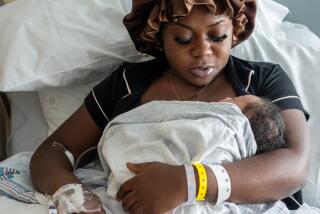REGION : Conference Focuses on Health Solutions
- Share via
As a nurse at a Watts hospital, Dorothy Porter has seen the physical health of the African American community firsthand.
Her diagnosis: “It could be a whole lot better.”
“So many don’t have insurance, and they only come (to the hospital) in a crisis,” said Porter, who for 17 years has worked at Martin Luther King Jr./Drew Medical Center.
She and hundreds of other health care experts came away from a recent three-day conference on improving the physical and mental well-being of blacks with the same message: The African American community needs more visits to doctors and clinics to catch illnesses in their early stages and learn more about staying healthy.
The Jan. 25-27 conference provided a forum for community residents, health care providers and religious leaders to discuss and prioritize health care needs and devise ways to achieve them.
“The community is taking control over their lives; they’re not waiting for anybody else to protect their health,” said Dr. Reed Tuckson, president of Charles R. Drew University of Medicine and Science, the hospital’s teaching wing.
The university sponsored the conference with Blue Cross of California, the federal Centers for Disease Control and Prevention and the county Department of Health Services.
The idea for the event originated with a group of community advisers who meet regularly with Tuckson to discuss the university’s role in the surrounding neighborhood. Daniel Tabor, a member of the community advisory council, said that his group wants to help people get healthy and stay healthy.
Topics at the conference included the high cost of health care, immunizations and the role of churches in promoting good health.
Ideas that were generated at the conference included the creation of interactive computers programs to help people diagnose illness, stepping up health education for the elderly and using community centers as makeshift clinics.
“People really spent time talking about solutions, not just problems,” Tabor said.
The workshop groups plan to reconvene separately this month to draft recommendations for change and improvement.
“We’ve got the ideas,” said Porter, a member of the education and outreach workshop. “Now it’s going to take energy to get out there and make it reality.”
More to Read
Sign up for Essential California
The most important California stories and recommendations in your inbox every morning.
You may occasionally receive promotional content from the Los Angeles Times.













